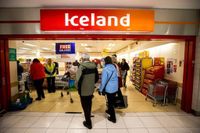Frozen food retailer Iceland has launched a bold new initiative aimed at tackling a surge in shoplifting across the United Kingdom, offering customers a £1 reward for reporting suspected thefts in its stores. The scheme, announced on August 16, 2025, by executive chairman Richard Walker, credits vigilant shoppers with £1 on their Iceland Bonus Card for every verified tip-off—an incentive that can be used immediately towards future purchases.
According to Walker, shoplifting exacts a heavy toll on the business. "Shoplifting costs Iceland around £20 million annually," he told Channel 5 News, emphasizing that this is not a victimless crime. "Some people see it as a victimless crime; it is not. It also keeps prices from being lowered because it is a cost to the business. It’s a cost to the hours we pay our colleagues, as well as it being about intimidation and violence." Walker explained that the losses siphon off resources that could otherwise support staff or help reduce prices for customers. "We’d like customers to help us lower our prices even more by pointing out shoplifters," he added.
The mechanics of the scheme are straightforward. Shoppers who alert staff to potential shoplifters will see their Bonus Card topped up with £1 if the information is verified—no need to catch the perpetrator red-handed. This approach, Walker said, is designed to empower loyal customers to support staff in deterring theft, especially as the problem has grown beyond major cities to affect smaller towns and rural areas alike.
The timing of Iceland’s move is significant. Shoplifting in England and Wales has reached record highs, according to official statistics released in July 2025. Police recorded 530,643 shoplifting offences in the year ending March 2025—a 20% jump from 444,022 in the previous year and the highest figure since current recording practices began in 2002-03. Retailers, however, warn that the real scale of the problem is likely much higher, estimating that only about two incidents are recorded per shop annually, with many crimes going unreported.
The retail sector’s anxiety over rising theft is palpable. Business owners and industry leaders have been sounding the alarm about shop theft spiraling out of control. As The Guardian reported, retail bosses are urging immediate action, especially as government ministers have pledged thousands more officers for local policing by spring 2026. The hope is that increased police presence will help stem the tide, but for now, many retailers feel forced to take matters into their own hands.
James Lowman, chief executive of the Association of Convenience Stores, commented on the latest figures, saying, "The recorded figures show more crimes are being reported, but this is still far too low," and added that many retailers have "no faith" in incidents being properly investigated. Lowman’s remarks reflect a broader disillusionment among shopkeepers, who often feel let down by the criminal justice system.
Katy Bourne, the national lead for shoplifting at the Association of Police and Crime Commissioners, has also called for a more robust response. Writing in The Telegraph, Bourne posed a pointed question: "What on earth has happened to our high streets and our city centres? Why do some people feel they can rob shops with impunity and abuse and assault staff without any fear of retribution?" She advocates not only for stronger police interventions and "meaningful criminal justice measures" to deter reoffending but also for rehabilitation for some offenders and "significant alternatives to our overcrowded prisons."
Walker’s stance is similarly uncompromising. He insists that theft is not only a financial issue but also a matter of safety and community well-being. "In order to combat any activity in Iceland stores, we’re encouraging our loyal customers to help sound the alarm, and if they do help to catch a shoplifter, we’ll top up their Bonus Card to spend in store," Walker stated. He hopes that by enlisting the help of the public, Iceland can create a deterrent effect that benefits everyone—staff, honest shoppers, and the business itself.
The scheme has generated debate about the role of customers in policing retail spaces. Some welcome the opportunity to contribute to a safer shopping environment and appreciate the direct reward for their vigilance. Others, however, have raised concerns about the potential risks of confrontation or mistaken accusations. Iceland has been clear that the reward is only given when reports are verified, aiming to minimize the chances of false allegations or unnecessary conflict.
The broader context is one of mounting frustration among retailers. As shoplifting continues to rise, many businesses are struggling to balance the need for security with the imperative to maintain a welcoming atmosphere for customers. For some, Iceland’s scheme is a pragmatic response to a growing crisis. For others, it’s a sign of just how desperate the situation has become.
Retail crime has long been a thorny issue in the UK. Over the past decade, economic pressures, changes in policing priorities, and the proliferation of self-service checkouts have all contributed to a challenging environment for shop owners. The cost-of-living crisis, which has put additional strain on household budgets, may also be fueling the uptick in theft, as some individuals resort to desperate measures.
Despite the challenges, retailers like Iceland are determined to fight back. The hope is that by incentivizing customers to act as the eyes and ears of the store, they can deter would-be thieves and reduce the financial burden of crime. Whether this approach will prove effective remains to be seen, but for now, it’s a sign of the innovative—and sometimes controversial—measures businesses are willing to take to protect their bottom line.
Meanwhile, the conversation about shoplifting has expanded beyond the confines of retail. Policymakers, law enforcement officials, and community leaders are all grappling with the implications of rising theft on public safety, economic vitality, and social cohesion. The debate touches on issues ranging from law enforcement resources to the adequacy of the criminal justice system and the social factors driving crime.
As Iceland’s initiative gets underway, all eyes will be on whether it can make a dent in the shoplifting crisis—or if it will simply highlight the scale of the challenge facing UK retailers. One thing is clear: the battle against retail crime is far from over, and the stakes—for businesses, their employees, and their customers—have never been higher.
For now, Iceland’s £1 reward scheme stands as a testament to the retailer’s resolve and the lengths to which companies are willing to go in the fight against shoplifting. Whether it becomes a blueprint for others or a cautionary tale remains to be seen, but it has certainly put the issue of retail crime squarely in the public spotlight.





